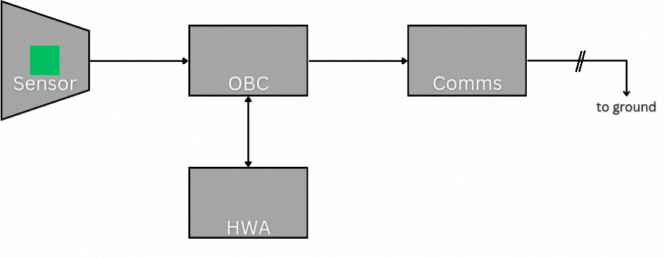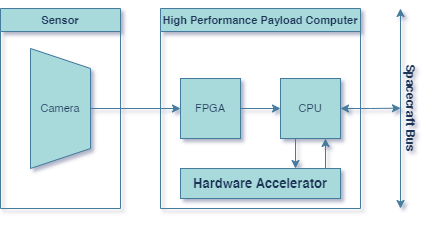Introduction
Hardware acceleration uses specialized hardware components, such as GPUs, FPGAs and ASICs, to execute computationally intensive tasks faster and more efficiently than traditional processors. This approach enhances system performance, reduces latency, and meets the growing demand for real-time data processing, particularly in sectors requiring rapid data analysis and decision-making.
At OHB Hellas, we specialize in providing tailored hardware acceleration solutions specifically designed for space missions. Our expertise lies in taking advantage of and delivering the most effective acceleration technologies, enabling faster, reliable data processing for mission-critical tasks such as real-time image analysis, navigation, and communication, ultimately enhancing the success and lifespan of space missions.

Challenges
While hardware acceleration offers numerous benefits for space technology, implementing it presents unique challenges:
Radiation Resistance
Space radiation can degrade electronic components. Hardware accelerators must be built to withstand these conditions without performance loss.
Thermal Management
Effective cooling systems are crucial in space, where heat cannot dissipate due to the vacuum.
Power Efficiency
With limited energy resources in space, accelerators need to maximize power efficiency to extend mission duration.
Size and Weight Constraints
Spacecraft components must be compact and lightweight, demanding optimization without sacrificing performance.
Development and Testing
Extensive testing is necessary to ensure reliability in the harsh space environment.
Why OHB Hellas?
At OHB Hellas, we specialize in leveraging a wide spectrum of hardware accelerators, ranging from traditional GPUs and FPGAs to specialized ASICs such as TPUs, VPUs and NPUs, to elevate satellite mission performance. By integrating these technologies and deploying advanced AI models on them, we ensure fast, efficient data processing in space, and introduce new, state-of-the-art capabilities to space systems.
Our expertise allows us to deliver tailored solutions that address the unique challenges of space. As demonstrated through our Satellite-as-a-Service platform, GIASaaS, and projects such as the Cognitive Cloud Dual-Camera Study, we continually push the boundaries of AI-driven data processing for space applications.
Why Hardware Acceleration?
Efficiency in Space Operations
In the realm of space operations, the role of hardware acceleration cannot be overstated. Space missions, whether focused on Earth observation, communication or exploration, generate and rely on vast amounts of data. The ability to process this data swiftly and efficiently is paramount. Hardware acceleration steps in as a critical solution, offering several key benefits:
- Enhanced Data Processing: Satellites equipped with hardware accelerators can process complex data, such as high-resolution images and sensor readings much faster than traditional methods. This speed is essential for timely decision-making and data transmission.
- Improved Communication Systems: In satellite communications, reducing latency and increasing throughput are vital. Hardware accelerators enable faster processing of signals, leading to more efficient and reliable communication links between space and ground stations.
- Energy Efficiency: Power is a precious resource in space. Hardware accelerators, by virtue of their efficient processing capabilities, consume less power compared to general-purpose processors, making them ideal for space applications where energy conservation is crucial.
- Payload Optimization: With hardware acceleration, the payload capacity of satellites can be optimized. Efficient processing allows for more compact and lighter hardware designs, which is a significant advantage given the high costs associated with payload weight in space missions.
In summary, hardware acceleration in space operations is not just about doing things faster; it’s about doing them starter and more efficiently, opening new horizons in how we explore and utilize space.
Real-time Decision Making in Space
The ability to make decisions in real-time is a cornerstone of modern space missions, and hardware acceleration plays a pivotal role in this. In the vast and unpredictable expanse of space, where every second counts, the speed at which data is processed can be the difference between success and failure.
- Onboard Data Processing: Satellites equipped with hardware accelerators can analyze data on-board, rather than sending all raw data back to Earth. This capability is crucial for time-sensitive applications, such as monitoring natural disasters or tracking weather patterns.
- Enhanced Scientific Research: In scientific missions, hardware acceleration allows for the immediate processing of complex scientific data. This real-time analysis enables scientists to make quicker, more informed decisions about the mission’s direction and focus.
- Autonomous Navigation: For spacecraft and rovers, especially those on deep space missions, autonomous navigation is essential. Hardware accelerators enable the rapid processing of navigational data, allowing these vehicles to make split-second adjustments to their course and avoid potential hazards.

Featured image: ©OHB Hellas





